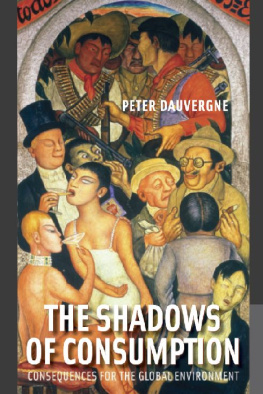ETHICAL CONSUMPTION
Copyright 2012. Berghahn Books. All rights reserved. May not be reproduced in any form without permission from the publisher, except fair uses permitted under U.S. or applicable copyright law.
EBSCO Publishing : eBook Collection (EBSCOhost) - printed on 2/7/2022 3:38 PM via
AN: 455183 ; James G. Carrier, Peter G. Luetchford.; Ethical Consumption : Social Value and Economic Practice
Account: pviewuni
ETHICAL CONSUMPTION
Social Value and Economic Practice
Edited by
James G. Carrier and Peter G. Luetchford

EBSCOhost - printed on 2/7/2022 3:38 PM via . All use subject to https://www.ebsco.com/terms-of-use
Published in 2012 by
Berghahn Books
www.berghahnbooks.com
2012, 2015 James G. Carrier and Peter G. Luetchford
First paperback edition published in 2015
All rights reserved. Except for the quotation of short passages for the purposes of criticism and review, no part of this book may be reproduced in any form or by any means, electronic or mechanical, including photocopying, recording, or any information storage and retrieval system now known or to be invented, without written permission of Berghahn Books.
Library of Congress Cataloging-in-Publication Data
Ethical consumption : social value and economic practice / edited by James G. Carrier and Peter G. Luetchford.
p. cm. Includes bibliographical references and index.
ISBN 978-0-85745-342-6 (hardback) ISBN 978-1-78238-676-6 (paperback) ISBN 978-0-85745-343-3 (ebook)
1. Consumption (Economics)--Moral and ethical aspects. 2. Social values. 3. Social ethics.
I. Carrier, James G. II. Luetchford, Peter G.
HB835.E843 2012
British Library Cataloguing in Publication Data
A catalogue record for this book is available from the British Library.
Printed on acid-free paper
ISBN: 978-0-85745-342-6 hardback
ISBN: 978-1-78238-676-6 paperback
ISBN: 978-0-85745-343-3 ebook
EBSCOhost - printed on 2/7/2022 3:38 PM via . All use subject to https://www.ebsco.com/terms-of-use
CONTENTS
James G. Carrier
Amanda Berlan
Peter G. Luetchford
Lill Vramo
Audrey Vankeerberghen
Tams Dombos
Giovanni Orlando
Cindy Isenhour
Peter Collins
Cristina Grasseni
James G. Carrier and Richard Wilk
EBSCOhost - printed on 2/7/2022 3:38 PM via . All use subject to https://www.ebsco.com/terms-of-use
PREFACE
The origins of this collection lie in a workshop held at the University of Sussex in April 2007, Hidden hands in the market, organised by Geert De Neve, Jeff Pratt and Peter G. Luetchford (see De Neve et al. 2008). The topics of the fifteen papers presented there varied widely, but many of those present were concerned with ethical consumption in one or another form. Certainly this was true of the two of us: Carrier was concerned with the logical nature of ethical consumption and Luetchford was concerned with the practices and images of ethical coffee production.
We were sufficiently intrigued by ethical consumption that we took the opportunity of the 2008 meeting of the European Association of Social Anthropologists, held in Ljubljana, to put together a panel on the topic. To our surprise and delight, after the panel was over the members, joined by some from the audience, ended up talking at sidewalk cafes and restaurants in a warm and sunny city for two days, trying to figure out what we had and what sort of approach might encompass it all. The result is the Introduction and the papers in this volume.
This volume reflects another history as well, the intellectual history of the two of us. For James Carrier, that history is a long concern with the nature of economic values, relations and institutions, especially as they exist in Western societies. For Peter Luetchford, the long concern has been with agriculturalists, particularly in an area in north-west Costa Rica where people grow coffee that is certified Fairtrade. These two concerns complemented each other in a way that is particularly pertinent for this volume, for Carrier was concerned with life at the receiving end of ethical consumption, while Luetchford was concerned with life at the producing end. Both of those concerns are reflected in the thinking that underlies this volume.
More than many collections of papers, this one is a collaborative effort. During those two days of talk by the river in Ljubljana, trying to make sense of what we had, we informed and encouraged each other, and focused each others thinking. Unfortunately, Deborah Gewertz and Fred Errington, who were involved with the panel, were unable to contribute to the volume because of the press of other commitments. While this volume is poorer by their absence, it is richer for their participation in that talk. The volume is richer as well for the participation of Richard Wilk, who was not in the panel but agreed to contribute to the Conclusion.
James G. Carrier and
Peter G. Luetchford
January 2011
Bibiliography
De Neve, Geert, Peter G. Luetchford, Jeff Pratt and Donald C. Wood (eds) 2008. Hidden hands in the market: ethnographies of fair trade, ethical consumption and corporate social responsibility. Research in Economic Anthropology 28 (special issue).
EBSCOhost - printed on 2/7/2022 3:38 PM via . All use subject to https://www.ebsco.com/terms-of-use
INTRODUCTION
James G. Carrier
Ethical consumption has attracted increasing attention in Europe and North America over the past few years. As it has become more popular, the label has been applied to more and more different things, which makes it important to identify what it means. The words themselves are an obvious place to start. They indicate that it means taking into account the moral nature of objects when deciding whether or not to consume them. That moral nature could, in principle, spring from almost anywhere; in contemporary ethical consumption commonly it springs from the objects social, economic, environmental and political context. Ethical consumers, then, are those whose decisions about what to consume (the consumption part) are shaped by their assessment of the moral nature of that context (the ethical part).
This encompasses a range of activities. Those who go to an ecotourism resort for a holiday rather than a conventional one, who bring their purchases home in their own bags rather than those provided by the shop, who refuse to buy cosmetics that have been tested on animals, who prefer the products of a company with a programme of corporate social responsibility, who take a train rather than a plane, all are basing their decisions on their assessment of the context of the objects on offer. Those who refused South African wine under the old apartheid regime, like those who refused Nestls products around 1980, rejected objects because they found aspects of their context to be wrong. The same is true of those who refused sugar produced with slave labour in the 1820s, as it is of Whites in the American South in the 1940s who refused to drink from a glass that a Black had used, and of those in 1930s Germany who refused to buy things sold by Jews.
My examples started with the uncontentious and ended with things that few people would recognise as ethical consumption. This breadth suggests that, if we want to make sense of ethical consumption, we need to go beyond the words. This Introduction will lay the analytical ground for the chapters that follow by going beyond those words, by locating ethical consumption in various of its social contexts to see what insights they generate. This, of course, requires approaching ethical consumption as a social phenomenon. The easiest way to do this is to start with its most obvious form.
Next page






